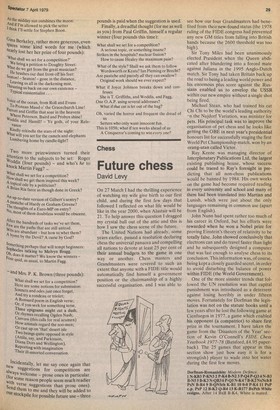Future chess
David Levy
On 27 March I had the thrilling experience of watching my wife give birth to our first child, and during the first few days that followed I reflected on what life would be like in the year 2000, when Alastair will be 21. To help answer this question I dragged my crystal ball out of the attic and this is how I saw the chess scene of the future.
The United Nations had already, some years earlier, passed a resolution declaring chess the universal panacea and compelling all nations to devote at least 25 per cent of their annual budgets to the game in one way or another. Chess masters and Grandmasters were revered to such an extent that anyone with a FIDE title would automatically find himself a government position or the chairmanship of a highly successful organisation, and I was able to see how our four Grandmasters had benefited from their new-found status (the 1978 ruling of the FIDE congress had prevented any new GM titles from falling into British hands because the 2600 threshold was too high).
Sir Tony Miles had been unanimously elected President when the Queen abdicated after blundering into a forced mate against Juliana in the 1995 Anglo-Dutch match. Sir Tony had taken Britain back up the road to being a leading world power and his enormous plus score against the Russians enabled us to envelop the USSR within our new empire without a single shot being fired.
Michael Stean, who had trained his cat Chi Chi to be the world's leading authority -n the Najdorf Variation, was minister for pets. His principal task was to improve the organisation of pet chess and he looks like getting the OBE in next year's presidential honours list for successfully staging the first World Pet Championship match, won by an orang-utan called Victor.
Ray Keene was managing director of Interplanatary Publications Ltd, the largest existing publishing house, whose success could be traced to Ray's foresight in pre dicting that all non-chess publications would be banned by 1984. His own works on the game had become required reading in every university and school and many of them had been translated into Martian and Lunish, which were just about the only languages remaining in common use (apart from English).
John Nunn had spent rather too much of his career in Oxford, but his efforts were rewarded when he won a Nobel prize for proving Einstein's theory of relativity to be totally false. John showed conclusively that electrons can and do travel faster than light and he subsequently designed a computer that was fast enough to analyse chess to its conclusion. This information was, of course, being kept a closely guarded secret, in order to avoid disturbing the balance of power within FIDE (the World Government).
One of the more sinister trends that followed the UN resolution was that capital punishment was introduced as a deterrent against losing horribly in under fifteen moves. Fortunately for Dorfman the legislation was not on the statute books until a few years after he lost the following game at Cienfuegos in 1977, a game which enabled his opponent (a compatriot) to share first prize in the tournament. I have taken the game from the 'Disasters of the Year' section of Kevin O'Connell's FIDE Chess Yearbook 1977-78 (Batsford, £4.95 paperback). The 25 games that appear in this section show just how easy it is for a strong(ish) player to wade into hot water during the first few moves.
Dorfman-Romanishin: Modern Defence.
1 N-KB3 P-KN3 2 P-K4 B-N2 3 P-Q4 P-Q3 4 N-B3 B-N5 5 B-K3 N-QB3 6 P-Q5 N-K4 7 B-K2 NxNch 8 PxN B-R4 9 B-QN5ch K-B1 100-0 P-K4 11 PxP e.p. PxP 12 B-K2 Q-R4 13 K-R1?? BxPch White resigns. After 14 BxB B-K4, White is mated.


































 Previous page
Previous page